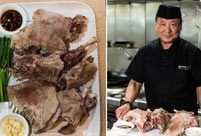 The 4th Chinese National Pole Dance Championship held in Tianjin
The 4th Chinese National Pole Dance Championship held in Tianjin
 Chinese navy commandos debut at 2014 RIMPAC
Chinese navy commandos debut at 2014 RIMPAC
 Guangxi impression: scenic countryside
Guangxi impression: scenic countryside
 World's largest aquatic insect found in Sichuan
World's largest aquatic insect found in Sichuan
 Ceremony volunteers for Youth Olympics make public appearance
Ceremony volunteers for Youth Olympics make public appearance
 A glimpse of female crew of Liaoning aircraft carrier
A glimpse of female crew of Liaoning aircraft carrier
 Stills from "Dad, where are we going?"
Stills from "Dad, where are we going?"
 Legless man's happy life
Legless man's happy life
 Top ten most beautiful islands in China
Top ten most beautiful islands in China
 Aerial view of Hong Kong
Aerial view of Hong Kong
CANBERRA, July 31 -- Mining billionaire Andrew Forrest has reportedly signed up three of China's biggest food companies to join his radical push to revive Australia's farm sector and position the nation as China's largest supplier of agricultural products over the next 100 years.
Forrest, who has long championed an Australian-Chinese food partnership, said he would like to see a time when Autralia was seen "as China's friendliest, largest, most reliable, highest quality, most competitive, most efficient food and agricultural products supplier."
The tycoon will be joined on Thursday by federal Agriculture Minister Barnaby Joyce, Business Council of Australia chief Jennifer Westacott and industry leaders in Sydney for the first meeting of the Australia-Sino 100-Year Agricultural and Food Safety Partnership, known as ASA 100.
Forrest told The Australian newspaper that he believed it was " unprecedented" for the Chinese agribusiness giants -- privately owned New Hope Group, state-owned COFCO Group and Singapore-listed Wilmar International -- to back such an initiative.
The idea for a 100-year partnership arose from a meeting between Forrest and Chinese Premier Li Keqiang in Beijing earlier this year. Forrest said Li's No. 1 concern was ensuring a safe food supply for China's 1.3 billion people.
Forrest made his fortune selling iron ore to China as the founder of Pilbara miner Fortescue Metals Group, but in recent years he has turned his attention to philanthropy and agribusiness.
In May, he acquired Western Australia's largest beef processor, Harvey Beef, which is the state's only accredited exporter to China.
Thursday's meeting will bring together the Australian side of the partnership, with meetings to be held in China in coming months.
The ASA 100 will comprise 50 members from each country who will meet annually. Members will include federal, state and territory ministers, major food producers and distributors from Australia and China.
Forrest rejected suggestions that Australia would struggle to become the "food bowl" for Asia due to constraints such as drought and a lack of infrastructure.
"Australia has had those constraints for over 200 years and at various points in time we've performed spectacularly well and competed spectacularly well overseas, and at other times we haven' t," he told The Australian. "I believe this is about a cohesive response from Australia."
Forrest said China had become used to dealing with Australian states and companies that were competing against each other.
Forrest said there were often gaps between state and federal policy and he believed the ASA 100 would enable participants to address inefficiencies across the sector.
He welcomed increased foreign investment in Australian agribusiness, admitting this put him at odds with Agriculture Minister Joyce.
 Blockbuster? No, it’s firefighters’ posters
Blockbuster? No, it’s firefighters’ posters
 Special 'gifts' for IT men for Chinese Qixi Festival
Special 'gifts' for IT men for Chinese Qixi Festival
 Foreign students' colorful life in China
Foreign students' colorful life in China
 French photographer‘s work 'China 2050' goes viral online
French photographer‘s work 'China 2050' goes viral online A bite of Halal Food
A bite of Halal Food
 Dressed in uniforms to marry you
Dressed in uniforms to marry you
 Female soldier in Chinese special force
Female soldier in Chinese special force
 Zhujiang ambassadors attend lotus lanterns activity
Zhujiang ambassadors attend lotus lanterns activity
 From girly girl to tough special police officer
From girly girl to tough special police officer
 22-year-old veteran travels around China
22-year-old veteran travels around China
 Night scenery of pagoda forests
Night scenery of pagoda forests China suffers from hot summer
China suffers from hot summer 48 hours after super Typhoon Rammasun
48 hours after super Typhoon Rammasun German pianist plays mid-air ‘magic carpet’ show over Munich Airport
German pianist plays mid-air ‘magic carpet’ show over Munich Airport
 China's manned deep-sea submersible conducts dive in Pacific Ocean
China's manned deep-sea submersible conducts dive in Pacific Ocean
Day|Week|Month